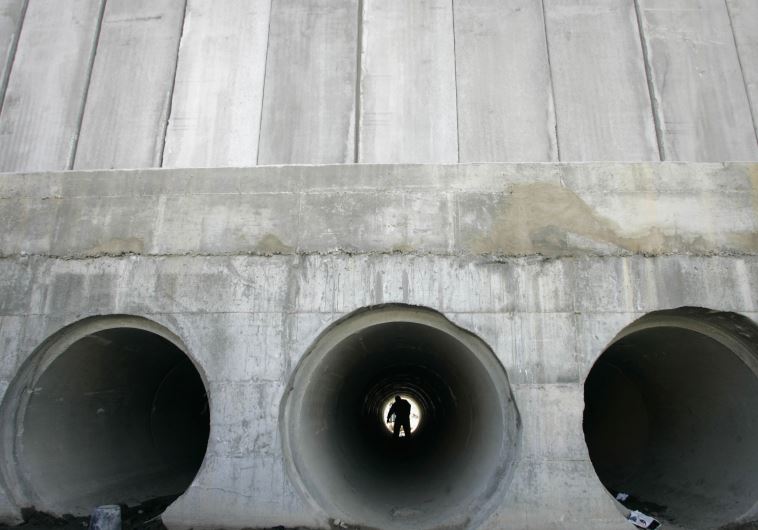Israel on Thursday dismissed Palestinian charges that it had cut the water supply to West Bank Palestinians, explaining that a broken water pipe had caused a temporary shortage.

A Palestinian walks through a water pipe underneath the controversial Israeli barrier in al-Ram, on the edge of Jerusalem [File]. – Photo: REUTERS
It published a short video of the broken pipe on its Twitter page on Wednesday, and has since fixed the pipe which services villages in the area of Jenin.
For the month of Ramadan, Israel has increased the water flow at night, when the usage is particularly high after the fast, the office of the Coordinator of Government Activities in the Territories, a branch of the Defense Ministry, said.
Separately, it also increased the flow of water in the Hebron and Bethlehem area by 5,000 cubic meters per hour, COGAT said.
It noted, however, that water demand there exceeds supply in the summer. Israel is working to expand the water infrastructure to fix that shortfall, a step that is made difficult given by the Palestinian refusal to cooperate on water issues, COGAT charged.
Water issues are regulated by the Israeli-Palestinian Joint Water Committee, which was established under the 1993 Oslo Accords. The committee has not met for more than five years.
Palestinian Authority Prime Minister Rami Hamdallah said on Thursday that Israel, through its national water company Mekorot, was deliberately cutting of the Palestinian water supply.
RELATED:
“Israel wants to prevent Palestinians from leading a dignified life, and uses its control over our water resources to this end; while illegal Israeli settlements enjoy uninterrupted water service, Palestinians are forced to spend great sums of money to buy water that is theirs in the first place,” Hamdallah said.
A number of media outlets also ran stories with headlines accusing Israel of deliberately depriving Palestinians of water.
In an official statement, Mekorot acknowledged the supply shortage across the West Bank, but said that water supplies were reduced, not cut off, in both Israeli and Palestinian areas of the West Bank because the current infrastructure cannot meet the increased demand during the summer months.
The company noted that a master plan was recently approved by the Israel Water Authority for the area’s water sector. This will include cleaning and upgrading the water infrastructure throughout the West Bank.
This, the statement said, will help Mekorot meet demand.
Yigal Dilmoni, the deputy head of the Council of Jewish Communities of Judea and Samaria, said that the pipes were old and that the settlements were also experiencing a shortage.






 Israeli New Shekel Exchange Rate
Israeli New Shekel Exchange Rate